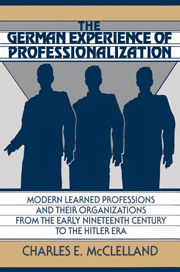 The German Experience of Professionalization
The German Experience of Professionalization Book contents
- Frontmatter
- Contents
- Acknowledgments
- Abbreviations
- Part I The problem of professions in Germany
- Part II The transition to modern professions in the early nineteenth century
- Part III Unified professions in a unified Germany?
- Part IV Breakthroughs and breakdowns: The professions enter the era of cartels and unions
- Part V The Weimar era
- Part VI The fate of professions under and after fascism
- 12 Collaboration, coordination, and professionalization
- 13 Conclusion
- A word about sources
- Index
12 - Collaboration, coordination, and professionalization
Published online by Cambridge University Press: 06 July 2010
- Frontmatter
- Contents
- Acknowledgments
- Abbreviations
- Part I The problem of professions in Germany
- Part II The transition to modern professions in the early nineteenth century
- Part III Unified professions in a unified Germany?
- Part IV Breakthroughs and breakdowns: The professions enter the era of cartels and unions
- Part V The Weimar era
- Part VI The fate of professions under and after fascism
- 12 Collaboration, coordination, and professionalization
- 13 Conclusion
- A word about sources
- Index
Summary
The fate and redefined role of learned professions under German fascism deserve a much fuller treatment than is possible in this broader history. Difficulties with sources remain formidable, although as this work goes to press there is hope that “openness” may also embrace some remaining German archives. The resurgence of autonomous professional groups and their development since the Nazi dictatorship will have to remain a topic for planned future publications by this author.
Nevertheless, one cannot fail to indicate in a few broad strokes how the major German learned professions fared under the beginnings of fascist rule. After the Nazi “seizure of power” at the end of January 1933, the policy of “coordination” (Gleichschaltung) of major institutions in German society became a chief instrument of the consolidation of National Socialist control. The learned professions were also a victim (and to a certain degree the willing collaborators) in this process. It went forward at different paces, with varying degrees of thoroughness, but certainly by the end of the 1930s every last vestige of independence had, at least nominally, been stripped from the major professional groups, most already within the first year or two of the “national revolution.” Thus, the 1930s constitute a logical closing place for this book. The process of formation of autonomous national professional groups and the process of modern professionalization had, with the swift strokes of the German dictatorship, seemingly been thrown on the rubbish heap of history, along with so many other traditional institutions and ideas loathed by that professional manqué, Adolf Hitler.
- Type
- Chapter
- Information
- The German Experience of ProfessionalizationModern Learned Professions and their Organizations from the Early Nineteenth Century to the Hitler Era, pp. 217 - 230Publisher: Cambridge University PressPrint publication year: 1991
